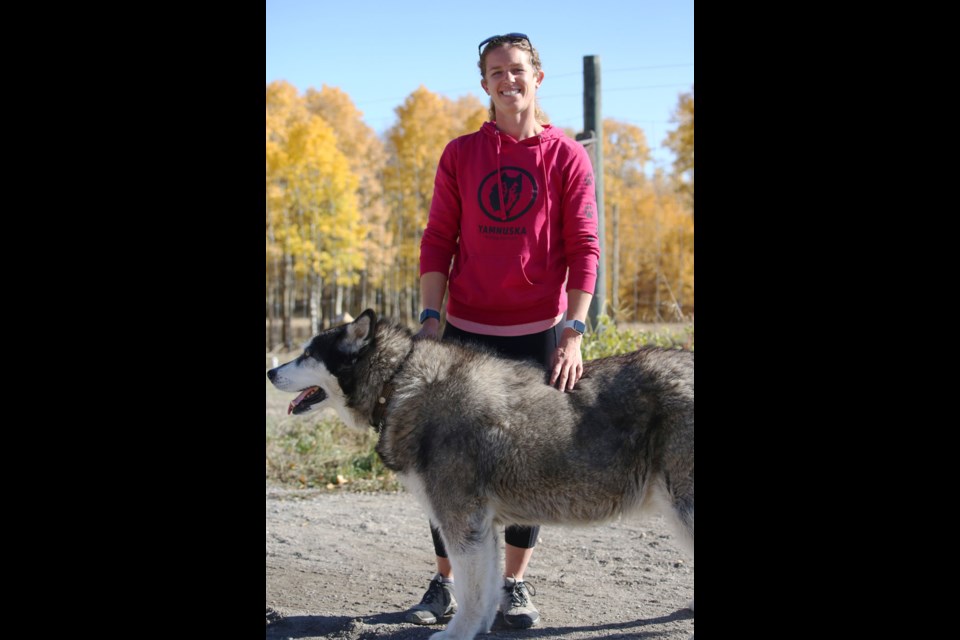COCHRANE – The Yamnuska Wolfdog Sanctuary held an open house Sept. 30 to celebrate the opening of its brand new Education Centre.
Georgina De Caigny, executive director of the Yamnuska Wolfdog Sanctuary, said she was excited to see the grand opening of the facility.
“It feels surreal that we finally have a proper space to be able to offer visitors what we’ve been wanting to offer all this time, which is a place where people can come and really learn all about these animals and walk away with an education about them.”
She said an added bonus was to have some office space in which she and her staff can work.
Prior to the education centre opening, there was a shop space and a garage, which functioned as the sanctuary’s gift shop.
The Yamnuska Wolfdog Sanctuary was founded in 2011 by De Caigny and Andi Scheibenstok.
Roughly six years ago, De Caigny said she realized the scope of her project was outgrowing the space they were in, which is when she decided to move to the location where the sanctuary now sits.
“For the last two years, we had far outgrown that space. With the new building, it’s going to help us give people a really well-rounded experience here and continue that education awareness of wolfdogs and wolves in the wild,” she said.
The mission of the Yamnuska Wolfdog Sanctuary extends well beyond showcasing the animals that call the space home.
Although it is a great experience to walk the beautiful grounds, observing the canines and listening to their howls, the main function of the sanctuary is to educate on how big of a responsibility owning a wolfdog is.
That is a lesson De Caigny learned the hard way.
When she was 19, De Caigny decided she wanted a wolfdog, but quickly realized she was in over her head.
“It ended up coming to a point where I ended up coming to the decision where I needed to give her up, or I really needed to change everything about my life to be able to provide her with what she needs to be happy and healthy,” she said. “Considering I still have her today, I obviously went with plan B.”
The animals are quite different behaviourally than other dog breeds she said.
“It’s next to impossible for them to be able to live a companion animal type of lifestyle. They are not born with the same affinity towards humans, they don’t want to please us humans, they don’t want to work for humans, they’re extremely intellectual animals they are professional athletes,” she said.
Wolfdogs need a lot of space to move about, they need secure containment, and they cannot be treated as a typical dog.
Typically they don’t do well with other pets or children, and they do not enjoy human interaction the way other dogs do, she said.
In Canada, it’s legal to adopt a dog that is up to 99 per cent wolf. To own a 100 per cent wolf, a permit is needed, which is common for most types of wildlife.
De Caigny said, her situation made her realize the need for a space for other animals in the same situation, which is why she started the Yamnuska Wolfdog Sanctuary nearly a decade ago.
The animals that arrive at Yamnuska typically stay there for their whole lives and because of that, the shelter’s ability to take in new animals is limited.
If a wolfdog owner with an animal that grew up in a family home environment contacts the shelter, the shelter will work with the owner to find another home for the pet, rather than accepting them into the shelter.
There is a process to adopt at Yamnuska, but it is quite unlike picking an animal from a shelter or store.
At the Yamnuska Wolfdog Sanctuary, the owner is matched with a dog after an extensive vetting process.
The COVID-19 pandemic had a huge impact on the sanctuary’s revenue, as tourism came to a sudden stop.
“COVID definitely threw a wrench in the sanctuary’s plans for sure. At the end of the day, most of our operating budget comes from being open to the public, and a lot of that is from international tourism,” she said. “Just like a lot of other businesses, we had to pivot and figure it out and see what could do to get by.
With the construction of the Education Centre well underway when the pandemic hit, the situation was “not so great,” she said.
However, Yamnuska has seen a huge uptick in visitors from around the area.
“I’m very happy to say it’s been amazing how much regional support we’ve gotten, and how many more regional visitors we’ve gotten over the last few months,” she said.
Some of the support came from visits, but some of the support has also come from students in the area.
Students at the Windsong Heights School came together to fundraise in support of one of the canine residents at Yamnuska, Horton – a neglected Irish wolfhound that was rescued in 2015 and has been living at the sanctuary since.
Students at Windsong engaged in a bottle drive to collect and donate funds to support Horton’s ongoing rehabilitation process.
Two students at the school also wrote a book called Horton Hears Our Howls, which is now on sale at the school and at the Sanctuary for $10. Several other students contributed illustrations for the project.
De Caigny said she was touched by the project and was happy to see some of the visitors to the park share her passion for the animals.
“That kind of stuff has to be one of the most surprising, one of the most fulfilling part of it all. People that don’t get to take care of these wolfdogs on a daily basis, that kind of thing, that they also fall in love with these animals and that they want to support the sanctuary,” she said.




